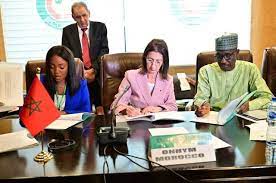Another important milestone has been achieved at the headquarters of the Economic Community of West African States (ECOWAS) as four significant Memoranda of Understanding (MoU) related to the Nigeria Morocco Gas Pipeline Project were signed.
Additionally, the project’s Steering Committee convened to discuss the progress of the Project and its strategic direction.
According to Garba Deen Muhammad, Chief Corporate Communications Officer NNPC Limited, four Memoranda of Understanding were signed on Friday, June 16, in Abuja as part of the Nigeria-Morocco Gas Pipeline Project.
These tripartite MOUs were respectively and successively signed between the Nigerian National Petroleum Company Limited (NNPC) and the Office National des Hydrocarbures et des Mines (ONHYM) of Morocco on one hand, and the Société Nationale des Opérations Pétrolières of Cote d’Ivoire (PETROCI), the National Oil Company of Liberia (NOCAL), the Société Nationale des Hydrocarbures of Benin (SNH-Benin), and the Société Nationale des Pétroles of the Republic of Guinea (SONAP) on the other hand.
These Memoranda of Understanding, he added are similar to those signed with ECOWAS on September 15, 2022, Mauritania and Senegal on October 15, 2022, and The Gambia, Guinea-Bissau, Sierra Leone, and Ghana on December 5, 2022, reaffirm the commitment of the Parties to this strategic project.
Once completed, the project will enhance the monetization of the natural gas resources of the affected African countries and also offer a new alternative export route to Europe.
The signings took place on the sidelines of the Steering Committee meeting of the Nigeria-Morocco Gas Pipeline Project, which was attended by representatives from ECOWAS and all the participating countries, including Nigeria, Benin, Togo, Ghana, Côte d’Ivoire, Liberia, Sierra Leone, Guinea, Guinea-Bissau, The Gambia, Senegal, Mauritania, and Morocco.
This significant infrastructure project will contribute to accelerating access to energy for all, improving the living conditions of the populations, integrating the economies of the sub-region, and mitigating desertification.
Also, it will achieve these goals through the provision of sustainable and reliable gas supply that aligns with the continent’s new environmental commitments, while providing Africa with a new economic, political, and strategic dimension.
In his remarks, the Group CEO, NNPC Ltd, Mr. Mele Kyari thanked President Bola Ahmed Tinubu and the Nigerian Government for entrusting NNPCL with this strategic project as the National Energy Company.
He added that “as a commercial enterprise, NNPCL sees this project as an opportunity to monetise Nigeria’s abundant hydrocarbon resources, by expanding access to energy to support economic growth, industrialization, and job creation across the African continent and beyond.
Also speaking, the Director General of ONHYM, Amina Benkhadra said that the gathering represents a progressive step in ensuring social and economic development through energy security and accessibility geared towards attaining total development of Africa by Africans.
In his remarks, the ECOWAS Commissioner for Infrastructure, Energy and Digitization, Mr. Sédiko Douka said the gas pipeline project is significant as it will help strengthen the region’s electricity production/generation capacity, stimulate industrial and agricultural development, and contribute to the energy transition by using a source of energy that is cleaner than other fossil fuels.
However, an oil and gas expert, Dr Ayodele Oni, says the ongoing Nigeria-Morocco Gas Pipelines (NMGP) project will boost the economic and industrial growth of all countries that signed a memorandum of understanding (MoU).
Oni told the News Agency of Nigeria (NAN) on Sunday in Lagos that the project would unify the economies of the relevant countries.
NAN recalls that four more countries, on June 16, signed up for the 5,000Km Nigeria-Morocco gas pipelines project, estimated to cost about 25 billion dollars to construct.
The project, which is an extension of the West African Gas pipeline, now has 13 countries on board.
The new countries, which signed a MoU at the ECOWAS secretariat, are Republic of Benin, Guinea, Liberia and Ivory Coast.
Oni, who also a partner, Bloomfield Law Practice, said the use of natural gas remained an avenue to explore clean energy for power generation.
According to him, the impact of NMGP, if successful, would be the creation of a highly competitive electricity market for Nigeria, and all the other countries who are parties to the project.
“Nigeria, who is the major supplier of natural gas for the project, seeks to hold 50 per cent interest in the project by capital contribution. It shall be one of the first beneficiaries of the project.
On how it can boost gas utility in Nigeria, Oni said that as the world transitions toward clean energy, the importance of gas could no longer be overlooked.
He said that government had an important role to play, by formulation of favourable policies that would aid the growth of the Nigerian gas market.
“These policies would address prevalent issues such as regulation of pricing for gas to power, unpaid gas supply invoices and pipeline vandalism etc.
“Government can put measures in place to protect pipeline infrastructure, solving the problem of payments owed to gas suppliers and a full deregulation of the gas market.
“We have enough hydrocarbon reserves in Nigeria.
“The problem has never been the presence of hydrocarbons but how to maximise the discovery and use of such hydrocarbons,”
Oni said that government could come up with policies that would make investments in exploratory activities in Nigeria attractive to potential investors.(NAN)(www.nannews.ng)
























